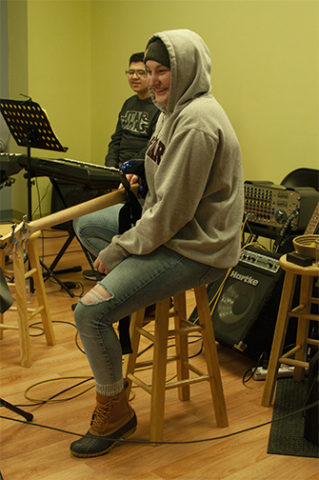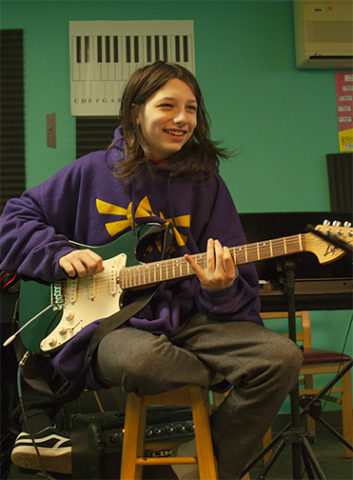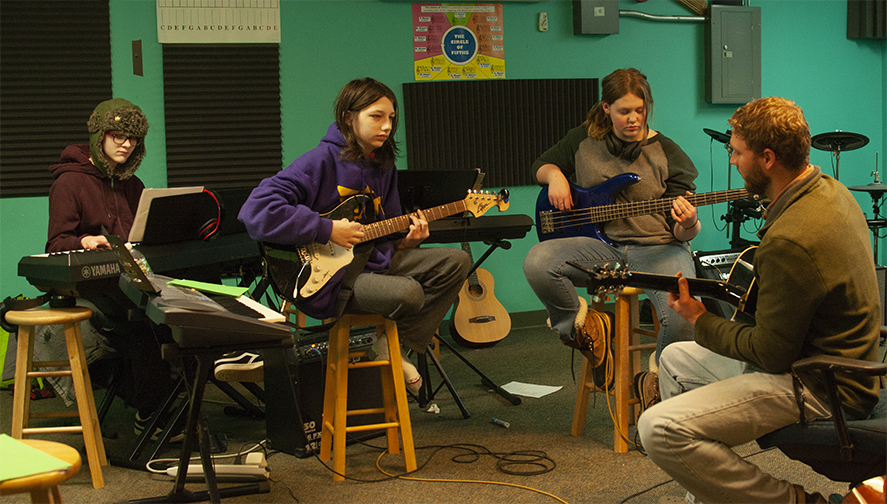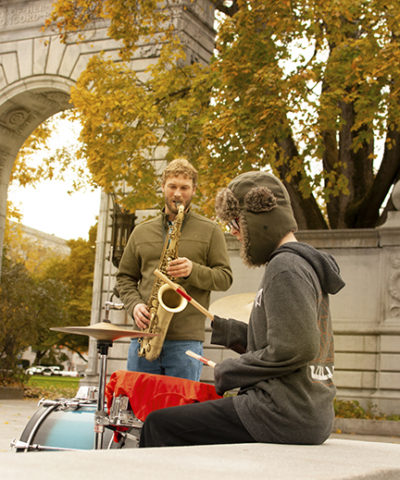 At Parker Academy we believe the work we are doing with these students is really important. We are hoping to have an ongoing dialogue with the people and programs that make Parker Academy what it is.
At Parker Academy we believe the work we are doing with these students is really important. We are hoping to have an ongoing dialogue with the people and programs that make Parker Academy what it is.
Today we are getting to know more about the Parker Academy Music Program. It seems to be an ever evolving, highly therapeutic program; and we are chatting with the music teacher, Zack Jones, to find out a little more about why this program is so important and inspirational for these kids.
Zack, how did music affect you when you were this age and how did you get into music?
“Music was basically the thing that always intrigued me. It always made sense in a way but was also a mystery. It always came back to my mom. She was a pianist when I was growing up, and she use to play piano all the time when I was little. I never took lessons, but I would take time playing and exploring sounds on the piano. I still come back to it, what it did for me emotionally and the fact that music can easily strike up emotions. I was really into music in terms of movies, in fact, growing up I wanted to me a film composer. As a kid I would come up with music to films in my head. My first piece was when I was about six. It was a four-part song, with distinct parts on the piano that told the story of how our dog died. The story of him playing, getting out, getting lost, and then getting hit by a car. You could clearly hear the distinct parts in the story, which is relatable at a young age. It was my way of processing that my dog died; those hard emotions. Music continued for me from that point.”
“This program exists in a new area of music, an area that blurs the lines between music education and music therapy.”
The music program existed before you came, what was it about this specific program that intrigued you and made you want to work at Parker Academy?
“When I first moved to New Hampshire I had a chance encounter with my predecessor, who refined the program. I stopped by his yard sale because I saw instruments. We chatted about mutual interests and how I also taught music. Two months later he had an idea that he might be leaving this position, and what I thought about it. I have a music education degree, but I had this idea that I did not want to work in the standard public music system. I am always a fan of doing things differently. I love to be more creative and more open ended. Before I even moved to New Hampshire I was already looking into programs dealing with music therapy. I was already interested in this bridge between music therapy and music education because for me, music was both. It was a thing I studied and it became academic. I got really into the music education part and the social emotional part was undeniable. That’s what I wanted to tap into more. Explore more. When I moved to New Hampshire it was right in front of me. This program exists in a new area of music, an area that blurs the lines between music education and music therapy. My predecessor and I are different people but when he described who the students were, and what the position was, it was the obvious next step. We are always trying to move this program forward.”
While you are talking about moving forward, we all know that the arts and music programs are continually getting cut from schools while Parker Academy’s is constantly growing. Why do you think that is?
“It is amazing if you think about the numbers. The fact that a school of 50 kids or less has a full-time music and art teacher is unheard of. There are schools in the same place with four times as many kids that do not have a full-time music teacher. So I guess that’s a credit to David Parker for really valuing that. I know it’s built into the philosophy of the Parker Academy, which is another reason why this is the perfect place for me to be able to commit to full time teaching. It allows for more kids to have access to music this way. They will come in contact with it at one point or another here. I will basically have all of the students for at least one semester. It all comes down to providing more access to music for the students.”

How do you incorporate these important concepts into your classroom?
“I think generally speaking, most of us know intuitively the value of learning and participating in music. There have been quite a few scientific studies about what happens in the brain when we play, learn, and practice music. It is pretty well documented but I think in our setting, with our students, it’s even more important that they have access to music. The music classroom and program here provides them with social emotional learning opportunities as well as music education opportunities. Playing music together in a group is not something a lot of these students have had the opportunity to do in the past. If you can see how they respond to being in this environment and having exposure to being with others, creating with others, even something as simple as being musically in sync with others; it is powerful.”
“We specifically created this program to be as student centered as possible.”
You say that it is easy to see the confidence and self-esteem of these students change when you are in the classroom. What does this look like?
“There are definitely a lot of students that have not had music in the past. They will start in this class and be unsure, shy, not have much confidence in the sounds that they are making. Fast forward to a month in, a semester, or after a performance; the change is obvious. You can see it in their body language, [and this carries to outside of the music room as well] their self-esteem, after they have an open mic night under their belt. I know this to be true, attendance in the classroom has increased after a performance. All the other metrics that we measure for student performance and progress will have an uptick right after a performance night. [We have never done a wide study on this but I definitely have seen this to be true in a number of students here].”
“What’s great about this program is that, as much as possible, it is student centered. We go to great lengths to make it relevant to the students in the classroom. Our small class size allows each class to be unique, working on different songs and programming. That is an important part of it. Most of the music we are playing the students bring forward. There is some music that I present as well because I have knowledge of music that I think they might like. I would say it is 20% from me and 80% from students choosing the songs. I am asking them what they are listening to that morning coming in off the bus. Then maybe later that same day we are learning that song in the classroom. You know there’s the personalization, exploring the music they like, how do they produce those sounds themselves, and what’s actually going in that song. Really digging deeper into these pieces of music that lends itself into realizing there is a lot more going on. It is more than just teaching the physical sounds to produce it. Over time their sense of music and their perception changes. Their taste may even change when they learn about/realize what’s going on in the music. What came before that, or what influenced the band they listen to. There is a strong sense of identity that often comes from the music that you listen to especially as an adolescent. That’s an important time. You will always hold those songs dear to you. There is a recent study that came out saying that the music that you listen to during this time period effects the brain differently because of the chemicals and hormones that are firing in the brain between 12-15 years old, that makes music just ‘the best’. There is something about the music you listen to in that time period that will instantly bring you back to that same place. There are some deep seeds planted in adolescence in terms of the music you listen to, and we explore those seeds directly in this music program.”

Why do you think students want to be involved with a program like this one at Parker Academy?
“I would say one of the biggest benefits is that we have the ability here to ‘start where the child is at. Because of our small class sizes we can go a little farther than that. We are able to talk about things more in depth. What are you listening to? What is that? Let’s figure that out. What are you interested in? What is it about music that gets you excited? What is it that sparks your interest and we can go right to it. We are different in some really interesting and important ways. We give time to explore. We specifically created this program to be as student centered as possible. We look at where their interests are. What is important to them should be reflected in everything we do. This is not imposing or regimenting everything to a small degree of learning, but creating a place to solidify a project-based student centered environment.”
Looking around your classroom it is clear to see you create some serious projects with the kids. What is the importance of technology in your classroom?
“The technology in an alternative music program like this is extremely important. Knowing the direction I wanted to move in, it seemed obvious to me to start embracing technology. We are small enough that we can have individual iPads for each students. During the last couple years I have gone to a few clinics about using iPads in the music room. You now have the power to create, compose, and produce music on a professional level with technology like an iPad or iPhone, which most students already have. There is a Grammy award winning producer who creates all of his music on an iPhone. This is the world we live in currently and this is something we should know. It is exciting the capabilities we now have working with an iPad. We have done some individual and group projects using the technology we have currently. There are a variety of different apps that we incorporate to make music creation really accessible to everyone in the classroom. Some connect visual arts with music, for those who are more visual. There are all kinds of visual adaptations you can make as well. We are really just scratching the surface in the last couple years. On our computers we have the ability to make professional level recordings. We can record live sound with the microphones and plug directly into our keyboards and drums. Students go through the entire process of recording, sound engineering, and production. There’s the possibility to unitize this technology and these things are becoming more common in our everyday life. We have even composed music for movies the students have made in other classes. There are a lot of cross curriculum work to be done with technology as well.”
[“Follow the Rhythm” written, recorded, and produced by the Parker Academy Ensemble]
You allow time for the kids to play out of the classroom. What are some of the activities you do?
“This is kind of in line with other music programs. Performance is an important aspect of music. It’s not our centerpiece, we are not always preparing for a performance. Sometimes we are just exploring and learning other things. Performance is a real important part in bringing what we have been working on up to a level where we feel comfortable playing for the public. It brings things into perspective for us, a reality check to a lot of things we do it. We could easily get lost in exploring, but if we don’t solidify things and start to actually put it together, then we are missing a whole aspect of being a musician. I truly believe that we can all be musicians, just because we are human. That is kind of my philosophy, and I think that effects what we are doing here as well. As musicians, playing music for others is part of what we can do to present our gift to the world. We do that in a couple of different ways. Our most consistent being our ‘Open Mic’ performances., everyone participates in them. We take great joy and pride in playing for our community, and take every opportunity to perform at activities downtown such as the “Rock N’ Race.”
“I truly believe that we can all be musicians, just because we are human.”
“Students that want to go that next step, and we have a good handful of those, allow us to look for other forms of performance opportunities. This year we looked forward to busking on the streets in downtown Concord. There is an immediacy playing for real people, random people, on the street. It is a completely unique experience that allows you to be in the moment and improvise at times. Performing in general is a practice in getting out of your comfort zone. This is a big deal and is something that we plan on and prepare for. It is part of being in this program, getting kids out of their comfort zone and into their performance. We have performed at the library, and taken a caroling group for the holidays around town into stops on Main Street. Any extra musical opportunities that we can put together we certainly try to make happen. We also have an ensemble. This has been something we have done since the start of the music program at Parker. There are always a handful of kids who want to go the extra step outside of classroom [even in this small of a school]. This would be another reason that a student may take interest in coming here. For the kids that are more dedicated in music, and want to put in extra time, then this is the group for you.”
Is there anything else you would like to add about the music program?
“The importance of the student centered nature of the program. The fact that we are learning songs that primarily come from the students and the class size allows us to do that. The fact that we are trying to incorporate social-emotional growth as well as academic growth is somewhat unique. This is a therapeutic day school, where the entire staff work together to help our students to move forward, to develop into vibrant, healthy human beings.That’s a big factor and an important aspect of our school. We know the arts are inherently therapeutic so providing access to the arts on a daily basis is a big factor.”




